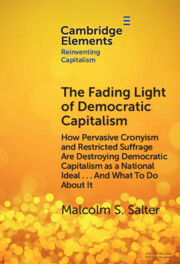Element contents
The Fading Light of Democratic Capitalism
Published online by Cambridge University Press: 14 November 2024
Summary
- Type
- Element
- Information
- Online ISBN: 9781009587655Publisher: Cambridge University PressPrint publication: 28 November 2024
Bibliography
- 2
- Cited by

